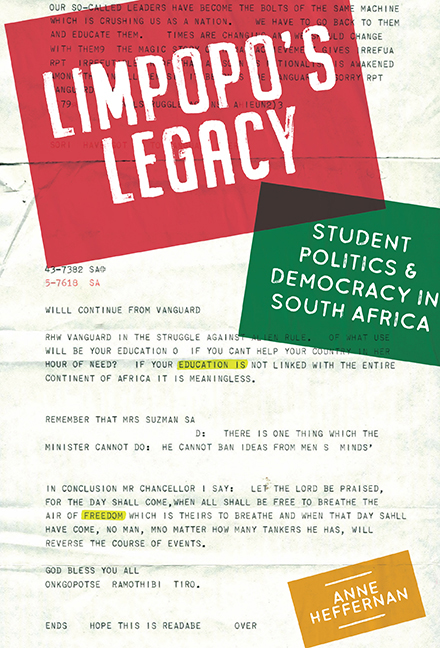Book contents
- Frontmatter
- Dedication
- Contents
- Acknowledgements
- Abbreviations and Acronyms
- Map of the north-eastern Bantustans showing the location of Limpopo
- Introduction
- 1 Turfloop, Crucible of Change
- 2 Centre of the Storm
- 3 Africanization: The New Face of Turfloop
- 4 Black Consciousness in Decline
- 5 Congresses and Comrades
- 6 Populism and the New Youth League
- 7 Julius Malema and Youth Politics in the New Limpopo
- Epilogue: Legacies of Limpopo
- Bibliography
- Index
7 - Julius Malema and Youth Politics in the New Limpopo
Published online by Cambridge University Press: 23 July 2019
- Frontmatter
- Dedication
- Contents
- Acknowledgements
- Abbreviations and Acronyms
- Map of the north-eastern Bantustans showing the location of Limpopo
- Introduction
- 1 Turfloop, Crucible of Change
- 2 Centre of the Storm
- 3 Africanization: The New Face of Turfloop
- 4 Black Consciousness in Decline
- 5 Congresses and Comrades
- 6 Populism and the New Youth League
- 7 Julius Malema and Youth Politics in the New Limpopo
- Epilogue: Legacies of Limpopo
- Bibliography
- Index
Summary
A tale of two leaders
The Northern Transvaal, now Limpopo Province, has not typically been renowned for famous daughters and sons, or for its contributions to the anti-apartheid struggle. Some activists from the area have been overshadowed by peers from other areas, written out of struggle history, or have come to prominence after migrating to the urban centres on the Rand, disassociating their legacies from their roots in the north. Many of these activists have been discussed in the preceding chapters, in an attempt to highlight their contributions, and the contribution of Limpopo, to the history of student and youth politics in South Africa. It is instructive to consider their omissions from regional struggle history – the way in which prominent national figures like Cyril Ramaphosa and Frank Chikane are now mostly divorced from their political roots at Turfloop in popular memory – but it is equally important to consider who is remembered in association with their regional roots.
Two men have been intimately linked with the politics of youth in Limpopo Province, as well as on a national scale in post-apartheid South Africa, and it is instructive to consider them both here. One, Peter Mokaba, founder of SAYCO and the first president of the 1991 Youth League, has already been discussed in some detail. The other, Julius Malema, who eventually succeeded Mokaba as the head of the Youth League, has not yet been mentioned. These two youth activists, separated by a generation, bear a good deal of comparison. Both came from poor townships near Pietersburg, were politicized relatively young through school structures, and rose to national prominence through immense populist appeal among their youth constituency. Both occupied a rhetorically radical space within the ANC, eliciting rebukes and censure from the main party, while exciting their base. The production of such leaders, and what they share with earlier activists from the province, has important implications for understanding youth politics in Limpopo, and its impact on youth politics nationally.
When we left Peter Mokaba in the previous chapter, he was a firebrand, immensely popular with his constituents, but notoriously difficult for party structures – both those of the UDF and of the ANC – to control. It is a measure of his political weight among a vast constituency of young South Africans that he weathered and survived not just charges of insubordination, but of disloyalty.
- Type
- Chapter
- Information
- Limpopo's LegacyStudent Politics & Democracy in South Africa, pp. 209 - 222Publisher: Boydell & BrewerPrint publication year: 2019



